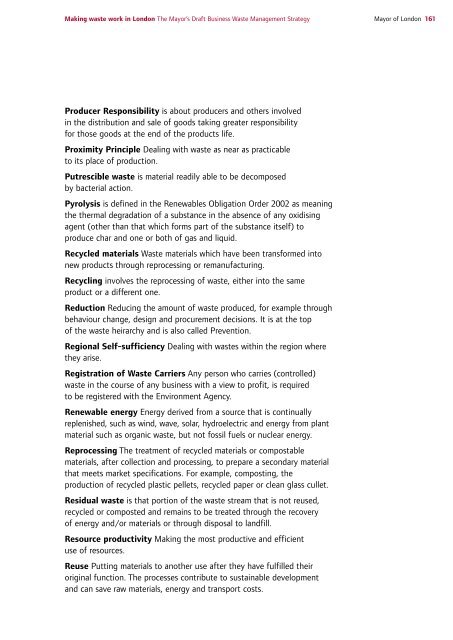Draft Business Waste Strategy PDF - london.gov.uk - Greater ...
Draft Business Waste Strategy PDF - london.gov.uk - Greater ...
Draft Business Waste Strategy PDF - london.gov.uk - Greater ...
Create successful ePaper yourself
Turn your PDF publications into a flip-book with our unique Google optimized e-Paper software.
Making waste work in London The Mayor’s <strong>Draft</strong> <strong>Business</strong> <strong>Waste</strong> Management <strong>Strategy</strong> Mayor of London 161<br />
Producer Responsibility is about producers and others involved<br />
in the distribution and sale of goods taking greater responsibility<br />
for those goods at the end of the products life.<br />
Proximity Principle Dealing with waste as near as practicable<br />
to its place of production.<br />
Putrescible waste is material readily able to be decomposed<br />
by bacterial action.<br />
Pyrolysis is defined in the Renewables Obligation Order 2002 as meaning<br />
the thermal degradation of a substance in the absence of any oxidising<br />
agent (other than that which forms part of the substance itself) to<br />
produce char and one or both of gas and liquid.<br />
Recycled materials <strong>Waste</strong> materials which have been transformed into<br />
new products through reprocessing or remanufacturing.<br />
Recycling involves the reprocessing of waste, either into the same<br />
product or a different one.<br />
Reduction Reducing the amount of waste produced, for example through<br />
behaviour change, design and procurement decisions. It is at the top<br />
of the waste heirarchy and is also called Prevention.<br />
Regional Self-sufficiency Dealing with wastes within the region where<br />
they arise.<br />
Registration of <strong>Waste</strong> Carriers Any person who carries (controlled)<br />
waste in the course of any business with a view to profit, is required<br />
to be registered with the Environment Agency.<br />
Renewable energy Energy derived from a source that is continually<br />
replenished, such as wind, wave, solar, hydroelectric and energy from plant<br />
material such as organic waste, but not fossil fuels or nuclear energy.<br />
Reprocessing The treatment of recycled materials or compostable<br />
materials, after collection and processing, to prepare a secondary material<br />
that meets market specifications. For example, composting, the<br />
production of recycled plastic pellets, recycled paper or clean glass cullet.<br />
Residual waste is that portion of the waste stream that is not reused,<br />
recycled or composted and remains to be treated through the recovery<br />
of energy and/or materials or through disposal to landfill.<br />
Resource productivity Making the most productive and efficient<br />
use of resources.<br />
Reuse Putting materials to another use after they have fulfilled their<br />
original function. The processes contribute to sustainable development<br />
and can save raw materials, energy and transport costs.
















